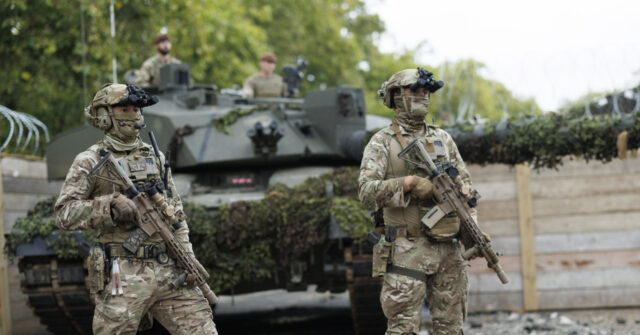We support our Publishers and Content Creators. You can view this story on their website by CLICKING HERE.

The British military is too small and the Ukraine war has shown the need to involve “the whole of society” in defence, but the public are deeply averse to the notion of conscription and steering talk away from that is “challenging”, a Parliamentary report on the lessons from Russia’s invasion finds.
The House of Lords International Relations and Defence Committee warns Western defence is no longer sufficiently threatening and consequently has failed to deter Russia from invading Ukraine, while lessons from the conflict itself demolish many long-held planning assumptions about what future wars would look like. The British Army is too small to effectively fulfil its NATO obligations or even make a meaningful contribution to more than one conflict at the same time, the committee’s new report states it has found, while condoning recent comments by senior Army officers that in future the civilian world needs to be drawn into defence for a “whole of society” effort.
The size and capability of the UK Armed Forces is predicated on a now apparently out-dated idea that any unexpected conflicts would be resolved in weeks, which has very much not been the case with the Ukraine War. The Lords’ report notes it has been the case a shrinking manpower has been explained away by increasing technical sophistication making up the capability, but argues this position too has been proven as wrong-footed.
The report stated: “…the UK has a well-trained and well-equipped force, but that it is too small and inadequately set up for large, prolonged conflicts like the one in Ukraine… the use of advanced technology has at times been used to justify smaller troop numbers. The war in Ukraine, however, has shown that in a conflict between two technologically capable states, technology is not a magic bullet that can swiftly end a war.”
The “wake up call” paper focusses on the “growing threat from Russia” and notes as well as the endless military recruiting crisis in the UK, caused in part by a dysfunctional recruitment system putting off good potential applicants — the abandonment of a Civil Defence establishment in the Cold War and a comparatively lightweight body of military reserves are also found to be major factors. Taken together, there is said to be a perception among the wider public that fighting wars is something done purely by an entirely separate from wider society military, with fighting done in far-away places and without meaningful impact at home.
While this may have been true in the Afghanistan-Iraq wars era, this time has passed, it is said. The paper states: “Involving the whole of society is crucial if we are to build a resilient and prepared nation. This would entail making the public much more aware of the dangers the UK is facing and, crucially, how they themselves can contribute to greater resilience.”
Although the Lords’ report restates points made in recent memory by senior officers warning that wider society must be prepared to get involved in national defence, it is important to craft these discussions so not to frighten the public. Making clear reference to a definite period at the end of the last government where the question of conscription became a major talking point, with a months long will-they-won’t-they in the newspapers, this new report notes as a warning: “How any discourse around non-military public contributions is articulated is challenging but important. There is always a risk that conversations could end up veering into discussions around conscription”.
Like many in the British military orbit who have looked with envy at the cost effective but enormously manned conscript-to-reservist armies of Europe, the House of Lords Ukraine: a wake up call report this week called on the government to consider a Scandinavian-style model. It said:
…Countries like Finland and Sweden can provide valuable insights. Both countries have adopted the concept of ‘total defence’, which involves all sectors of the government, the economy and civilian population in defence planning. In both countries, the concept of total defence is well embedded in the national psyche. Finland, for example, has a small regular armed force, but can mobilise a large number of troops quickly due to its comprehensive national defence strategy, which includes significant civilian involvement, including from a large pool of reserves.63 Sweden’s approach is also one of total defence and includes a range of activities to prepare Sweden for national
emergencies and war.64 Sweden has a wide range of voluntary defence organisations linked to this effort.…
…the UK Government should build public understanding around the role the general population can play in building national resilience and contributing to national security and defence, moving beyond the notion that defence is the sole responsibility of the military. Plans must be developed in consultation with the general public, so that communities have ownership over plans and are motivated to participate in them. The UK Government should learn from the experiences of other nations, such as the Scandinavian concept of ‘total defence’.
As stated, these points have been raised constantly by Western military leaders — and not just in the United Kingdom — since the outbreak of the Ukraine war. The erstwhile Chief of the General Staff Sir Patrick Sanders said earlier this year that the United Kingdom is now living in the “prewar generation” and that it is now time for “preparatory steps to enable placing our societies on a war footing”.
He observed in January: “Our friends in eastern and northern Europe, who feel the proximity of the Russian threat more acutely, are already acting prudently, laying the foundations for national mobilisation… taking preparatory steps to enable placing our societies on a war footing when needed are now not merely desirable but essential.
“We will not be immune and as the pre-war generation we must similarly prepare – and that is a whole-of-nation undertaking.”
The British Army itself, which has been closely involved in the Ukrainian war effort behind the front lines by training tens of thousands of new Ukrainian soldiers has been saying behind closed doors the experience has helped it re-learn how to rapidly generate a new “citizen army” should it be needed in a hurry. A Ministry of Defence source was said to have remarked this year: “We are observing that a lot of what we are doing could act as a mission rehearsal for generating our own second echelon”.

 Conservative
Conservative  Search
Search Trending
Trending Current News
Current News 







